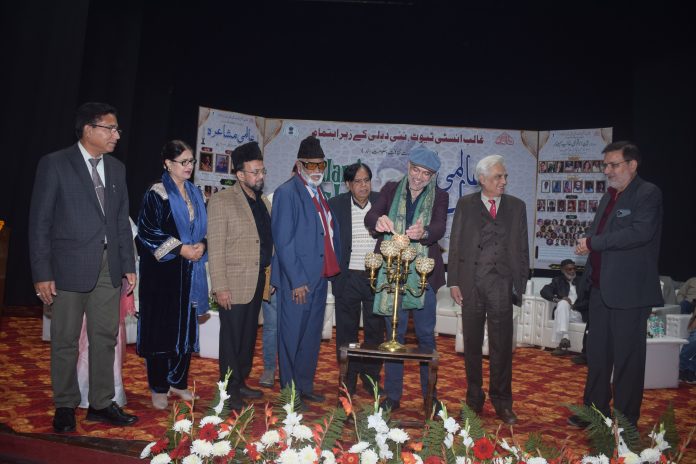New Delhi: The Ghalib Institute’s three-day international celebrations dedicated to the legendary poet Mirza Ghalib are in full swing. On the second day of the seminar, scholars and speakers from India and abroad presented their papers across four literary sessions held on December 21.
The first session, presided over by former head of the Urdu Department at Jamia Millia Islamia, Professor Qazi Obaidur Rahman Hashmi, focused on the theme of curiosity in Ghalib’s poetry.
During his presidential address, Professor Hashmi stated that curiosity is the cornerstone of Ghalib’s poetic identity and that exploring this aspect in the modern era could unveil new dimensions, making discussions on Ghalib ever-relevant. Papers presented in this session included “Mirza Ghalib and Mental Turmoil” by Dr. Ahmed Imtiaz, “Ghalib and the Woes of Livelihood” by Dr. Tausif Dara, and “The Interrogative Style of Address in Ghalib’s Poetry” by Dr. Naushad Manzar. The session was moderated by Dr. Shahid Iqbal.
The second session, chaired by Professor Abdul Haq, explored Ghalib’s connection to Persian literature. Professor Haq highlighted that understanding poets like Ghalib and Iqbal requires a command of Persian, an area where more attention is needed for future generations. Papers included “A Unique Tone of Ghalib’s Complaints” by Dr. Khalid Alvi, “The Creative Response of Ghalib” by Professor Shafey Kidwai, “Dramatic Elements in Ghalib’s Letters” by Mr. Zaheer Anwar, and “Ghalib’s Concept of Existence” by Dr. Moeed Rashidi. Mr. Sunil Trivedi attended as the guest of honour, and Dr. Alia moderated the session.
The third session was held online and co-chaired by Professors Sadiqur Rahman Kidwai and Qazi Jamal Hussain. Professor Kidwai remarked that the seminar’s theme this year serves as a test to avoid redundancy, while Professor Hussain emphasised separating a poet’s creative persona from their personal life when analyzing their work. Papers in this session were presented by Professor Tahseen Firaqi, Professor Asghar Nadeem Syed, and Professor Nasir Abbas Nayyar, with introductions by Professor Sarwarul Huda.
The fourth session, chaired by former head of the Persian Department at Aligarh Muslim University, Professor Azar Mehdi Dakht Safavi, highlighted the contributions of Persian scholars to Ghalib studies. Professor Safavi praised the inclusion of prominent researchers from Iran in the seminar. Papers presented included “Persian Perspectives on Ghalib” by Professor Mohammad Raza Nasiri, “An Analysis of Meher-e-Nimroz” by Professor Karim Najafi, “The Tone of Complaint and Ghalib’s Creative Mind” by Professor Ekhlaq Ahmad Ahan, and “Ghalib and the Sense of Grief” by Dr. Rashid Qadri. The session was moderated by Dr. Syed Wajahat Mazhar.
Prior to the session, two books, Dastan-e-Lucknow and Dabistan-e-Lucknow by Agha Mohammad Baqir Shams, and Meher-e-Nimroz, edited by Professor Karim Najafi, were unveiled. Agha Shams’s grandson, Mr. Waqar Haider, and Professor Anees Ashfaq also shared brief remarks on the occasion.
The day concluded with an international mushaira presided over by Mr. Waqar Haider (USA). Special guests included Mr. Jaleel Nizami (Qatar) and Mr. Ameer Mehdi (London), with Mr. Mansoor Usmani serving as the moderator. Notable poets who recited their works included Professors Atiqullah, Shahpar Rasool, Farooq Bakhshi, and Mehtab Haider Naqvi; Dr. Nawaz Deobandi; and renowned poets Shakil Azmi, Moin Shadab, Mujahid Faraz, and others, as well as prominent female poet Ismat Zaidi Shifa.




